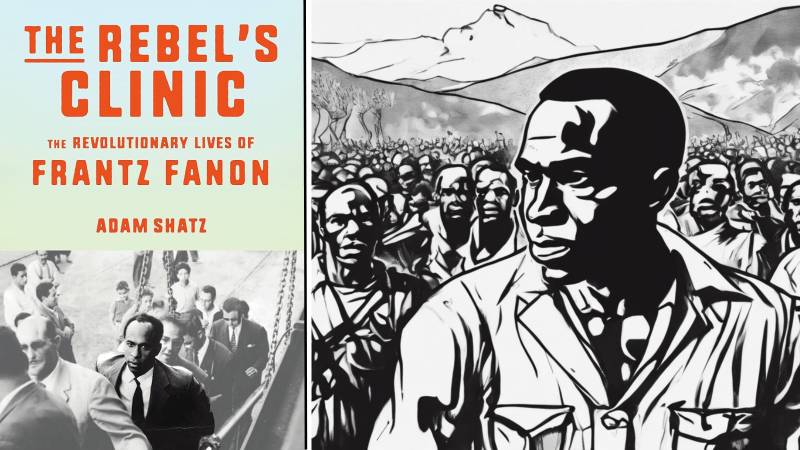
Adam Shatz's The Rebel’s Clinic, The Revolutionary Lives of Frantz Fanon has been longlisted for The Baillie Gifford Prize 2024. It is no surprise because as I was discussing over dinner with my father, who read and finished this brick of a book before me, it is less of a reader-friendly novel and more of a research project, although excellently written. Overall one gets the sense that Fanon is admired by the author, Shatz, who proves that he has absolute understanding and knowledge about all that is ‘Fanon’ – his life and work.
The book chronicles Frantz Fanon’s life, who was born in 1925 in Martinique, a French colony. When Fanon was young, he fought in Charles de Gaulle's army for the liberation of France during World War II and trained to become a doctor and psychiatrist. Such activities as a person of colour under French colonial rule impacted him a great deal. In 1952, he analysed the effects of racism on the human psyche in Black Skin, White Masks. About Black Skins, White Masks Shatz describes Fanon’s ideas as: “To be Black and colonised is to inherit a world your ancestors haven’t made and to be condemned to mimicry. An impossible mimicry, because wearing a white mask will not make you white, much less set you free; on the contrary it reinforces alienation and self-loathing.”
Fanon was soon re-assigned to a hospital in French Algeria. Here, he became involved in the rebellion of the National Liberation Front (FLN), which wanted to break Algeria free from the colonial rule of France. Fanon's work for the FLN as a polemicist and psychiatrist became highly controversial. His final work, The Wretched of the Earth, was published in 1961, right before he died at the age of 36 in the USA, the land he termed 'The county of lynchers’, according to Shatz. Like Fanon, who was himself sometimes a dividing figure – both revered and hated for his militancy – The Wretched of the Earth is certainly one of the most controversial but also one of the most powerful works of the modern era.
The idea of decolonisation is not foreign to young people of the left, but the concept is applied now not to settler colonies which Fanon fought against, but rather to museums, universities, concert programmes, and even restaurant menus
Shatz explains that The Wretched of the Earth: “is in so many ways a marriage in prose of the two places the formed Fanon’s political imagination: Martinique and Algeria…The Wretched of the Earth was Fanon’s most polemical book; it was also, paradoxically, his most literary.” In it he explains clearly that the “cause is the effect: you are rich because you are white and you are white because you are rich...For the colonised desire is not simply a matter of wanting what they don’t have, of what Sartre called “scarcity.” It is a matter of wanting what others – the foreigners, the colonisers – have taken from them, starting with their land.”
Fanon describes that in configuring the natives, the coloniser is always reaching for “the bestiary.” Fanon argues that a colonised person is under no illusion of what is thought of him, and “roars with laughter when he hears himself described as an animal. For he knows that he is not an animal. And at that very moment, he discovers his humanity, it begins to sharpen his knives to secure its victory.” In The Wretched of the Earth, Fanon advises revolutionaries seek the help of the lumpenproletariat (lowest rung of society – peasants, vagabonds, etc.) to expel the colonisers. And he hopes that this will happen all across the developing, colonised world.
After Fanon passed away, he become somewhat of an academic celebrity whose writings were used by so many often-clashing agendas, each claiming their view of the world was the right one. As Shatz claims, “The racial divisions and economic inequalities that he protested were not so much liquidated as reconfigured.” The idea of decolonisation is not foreign to young people of the left, but the concept is applied now not to settler colonies which Fanon fought against, but rather to museums, universities, concert programmes, and even restaurant menus – according to Shatz. We have no idea what Fanon would think of today’s tokenism.
The Rebel's Clinic is a biography written with great elegance and flow, of the rather short and difficult life of Frantz Fanon. Fanon was both a healer of psychiatric patients by day and a revolutionary by night. A doctor and a revolutionary all at once – merged into one soul. He was a husband to his wife Josie and father to their son Oliver. Josie kept his memory alive many years after his death until she committed suicide one day in 1989, soon after visiting his grave. The book is a wonderful and detailed investigation of Fanon’s ideas. In the modern world, where we are faced with sometimes emotional and heart-wrenching discussions on Black Lives Matter, colonisation, and race Shatz’s book is a must-read for us to stay informed and remind ourselves that Fanon remains relevant as long as inequality exists.

